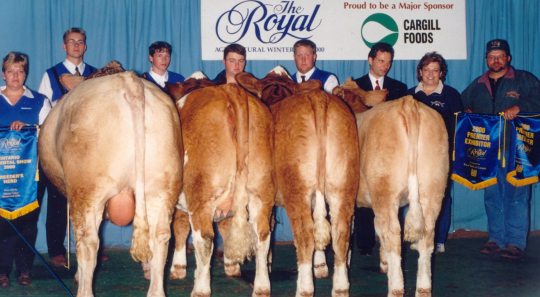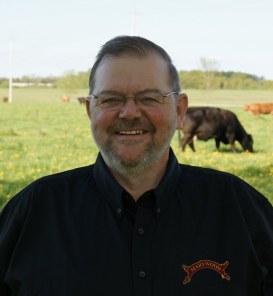  |
Who We Are
Marywood Simmentals is a family-operated cow/calf farm in Wellington County, Ontario. Ron and Mary Ellen Wooddisse’s farm is home to purebred Simmental cows, as well as some Red Angus and crossbred cows and has since now been taken over by his son and daughter inlaw Josh & Taika Wooddisse. The entire family has been involved in the day-to-day operation of the farm and has shown cattle around the country.
The name “Marywood Simmentals” is the combination of “Mary Ellen” and “Wooddisse,” created by Ron to sweeten the news of a surprise purchase of a couple of purebred Simmental cows. Ron gained industry knowledge and contacts through his involvement in the local Simmental association and the Ontario Simmental Association before moving into the Canadian Simmental Association. Marywood grew with the support of Ron’s brothers Richard (Richwood Simmentals) and Dave and brother in-law Bob McFarlane (McRobdon Simmentals) and good friend Dave Milliner (Waydamar Farms).
Genetic Development
Marywood strives to produce calves that weigh half their mother’s weight at weaning and grow to 1,300lb within 13 months of age on an all-vegetable diet with no growth hormones. By selectively promoting genetic traits, breeding produces an ideal cow that matures early, is exceptionally fertile, breeds back within 60 days and produces a 700-lb calf at weaning. With these genetics, Marywood produces breeding animals and strives for two sales per year. The animals that do not meet breeding requirements are sold by boxed meat.
Marywood Simmental
My wife and I are carrying on the Marywood Simmental name with a growing herd of our own. I currently help manage the Marywood Breeders Group. I have been involved in the cattle industry for most of my life. My wife Taika, is in her final year of veterinary school with plans to go into a large animal practice. The Marywood Breeders Group is looking at the beef industry as a whole and striving to produce animals that will make cow calf producers more successful, but also produce animals that will do better in the feedlot, and have more saleable meat in the cooler. For the consumer we want them to have a consistent experience eating tender beef. This is our passion, to strive for an animal that can improve the whole industry, that's why we use so many metrics, measurements, genetic evaluations as well as DNA. So when you buy animals from us, you know you're improving your herd as well as the industry for today and tomorrow.
Josh & Taika Wooddisse
8491 Line 14 RR1 Palmerston, ON N0G 2P0 (519) 362 -5373 marywood@marywood.ca
Richwood Simmentals
Back in 1984 we registered our first Simmentals and began our quest to produce the ultimate beef animal. In 1987 we started BIO testing bulls at the Arkelll test centre. But more importantly in that year I married the love of my life Janette. For a wedding gift my tremendous family give us nothing better than a beautiful Simmental heifer and the herd began to build. Shortly after that Marywood Simmentals began. That was the start of an accelerated effort to find the recipe for efficient beef production.
EPDs were the place to search out animals with calving ease, maternal calving ease along with performance. Cattle that are structurally correct, problem free with a compatible attitude are a must . The goal to achieve was and is a cow to easily calve 6% of her weight and wean at 205 days 50% of her weight. Then to have that calf go on to finish at a market weight of 1400 lbs at 14 months with a AA marble and a 65% lean meat yield. More importantly she should have her first calf before her second birthday and maintain a 12 month calving interval till 10 yrs of age. Lofty goals but if you do not set the bar high efficiencies needed will not be achieved. Ultrasound information scrotal and frame score became a regular part of the selection process.
With the increased costs of land base, we have reduced our cow herd down under 40 breeding females. We believe there are efficient aspects of our fall calving program.
Short fall grass on limited pastures reduce udder blow-ups. Pasture calving on warm dry ground reduces mortalities. Weaning calves to spring grass for minimal stress. Peak prices for grass calves, on the down side is the need for higher quality winter. Regardless of whether you calve in winter, spring, summer or fall our goal remains the same to produce fertile functional cattle that will adapt to your environment and be efficient in increasing your bottom line. We thank you for interest in the program and look forward to working with you in the future.
Rich Wooddisse
RR1 Moorefield, ON N0G2K0 (519) 638-3245 richwood@tdtech.ca
McRobdon Simmentals
McRobdon Simmentals have been affiliated with the Wooddisse family and Marywood for the past 16 years. We started off with a small full blood cowherd with quality genetics and have gradually switched to a red and black purebred herd and most recently to a fall calving program.
We are also aligned with the Marywood Breeders Group in an attempt to bring you, are buyers a predictable purchase followed up by the carcass and genetic information to help you get a good payback at the end of the day. We have proven over the years that genetics can drive performance. We look forward to your enquiries and assure you that we stand behind our product.
Bob & Donna McFarlane
RR6 Mount Forest, ON N0G 2L0 (519) 323-1780 mcrobdon@hotmail.com
Waydamar Farms
Our cowherd consists of 75 breeding females, retaining about 15 bull and 30 heifer calves to develop annually. We have 55 cows in our winter calving group and 20 females in the fall program. We AI about 20 to 25 females and run 4 of the Marywood Group partnership herd bulls during spring breeding season and 2 in the fall group. We breed in excess of 100 females annually selling 25 to 30 bred heifers or young cows each year.
Our winter born bull calves are developed at the Kenilworth Bull Test Station and the fall bulls with the Marywood Group. We sell the bulls annually through the PIC and Marywood sales, as well through private treaty. The heifer calves we develop at home on a growing ration to make females that will not need to be pampered as mature cows. We ultrasound evaluate and breed to selected AI sires or our easy calving herd bull for that purpose.
We select our cowherd and herd sires very hard for temperament, confirmation, fertility and longevity. Our selection of external herd sires and replacement females is based on historical information we have access to, carcass evaluation, expected progeny differences and breeding goals that we want to enhance. Our cattle are low maintenance and have to do it on their own, as we are not always there all the time because of other commitments. Thanks for your interest in our program.
Gayle Dave & Grant Milliner
225641 SOUTHGATE ROAD #2 RR1 Dundalk, ON N0C 1B0 (519) 923-9188 dgmilliner@everus.ca
Ron Wooddisse

Ron had a keen interest in genetics and a voracious appetite for numbers which back up the traits that created great meat and milk. Although Marywood was home to 230 cattle, Ron knew all of his animals at a glance and could easily pick out family trees in his own herd, as well as other herds. Over the years he built his knowledge from working on many boards and associations, including: Ontario Cattlemen’s Association, Canadian Cattlemen’s Association, Canadian Beef Breeds Council, Canadian Grading Agency, Ontario Simmental Association, Wellington County Cattlemen’s, Ontario Member Co-op Association, Grain & Feed Dealers Association and the Fertilizer Institute of Ontario. We loss Ron in the fall of 2010.
